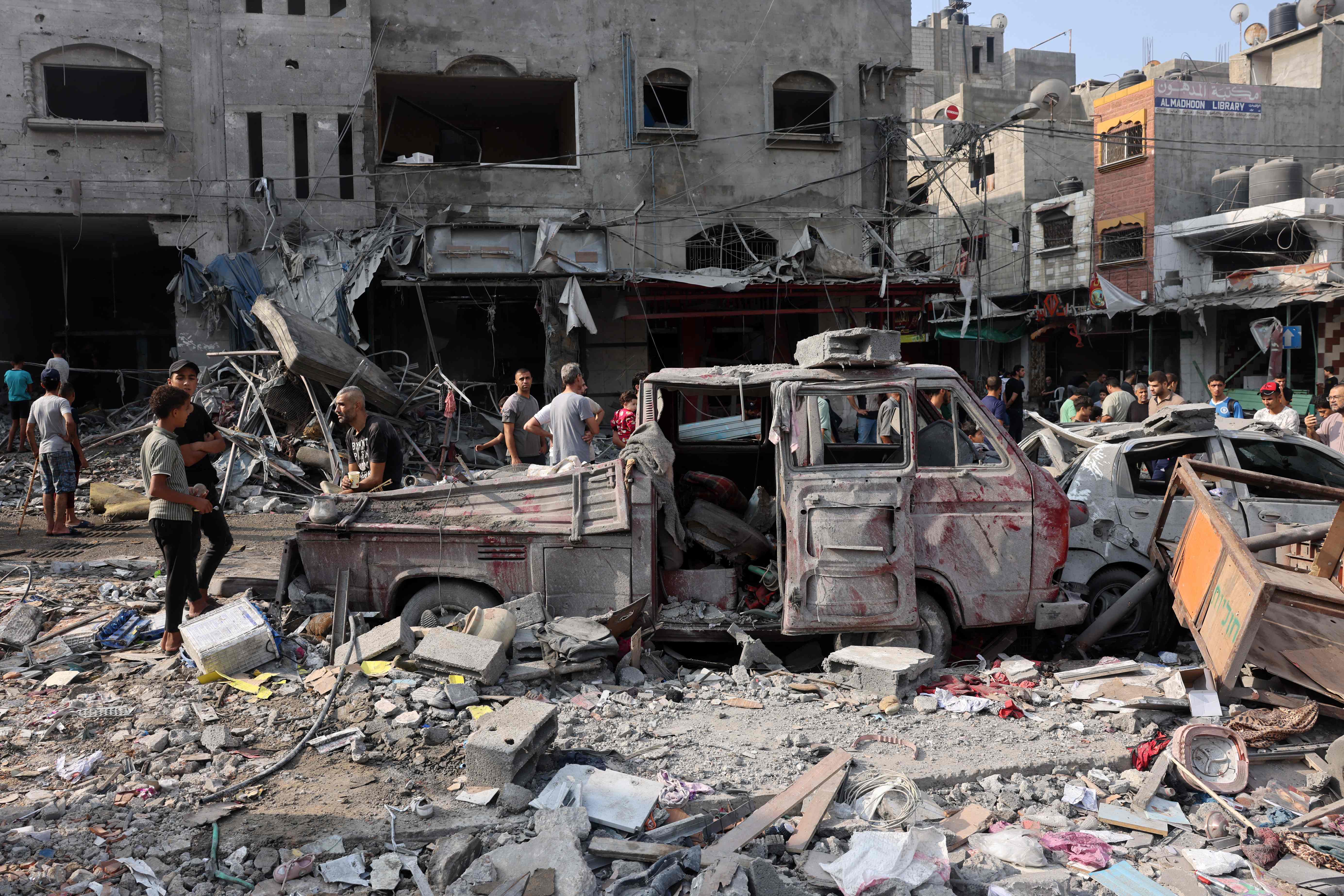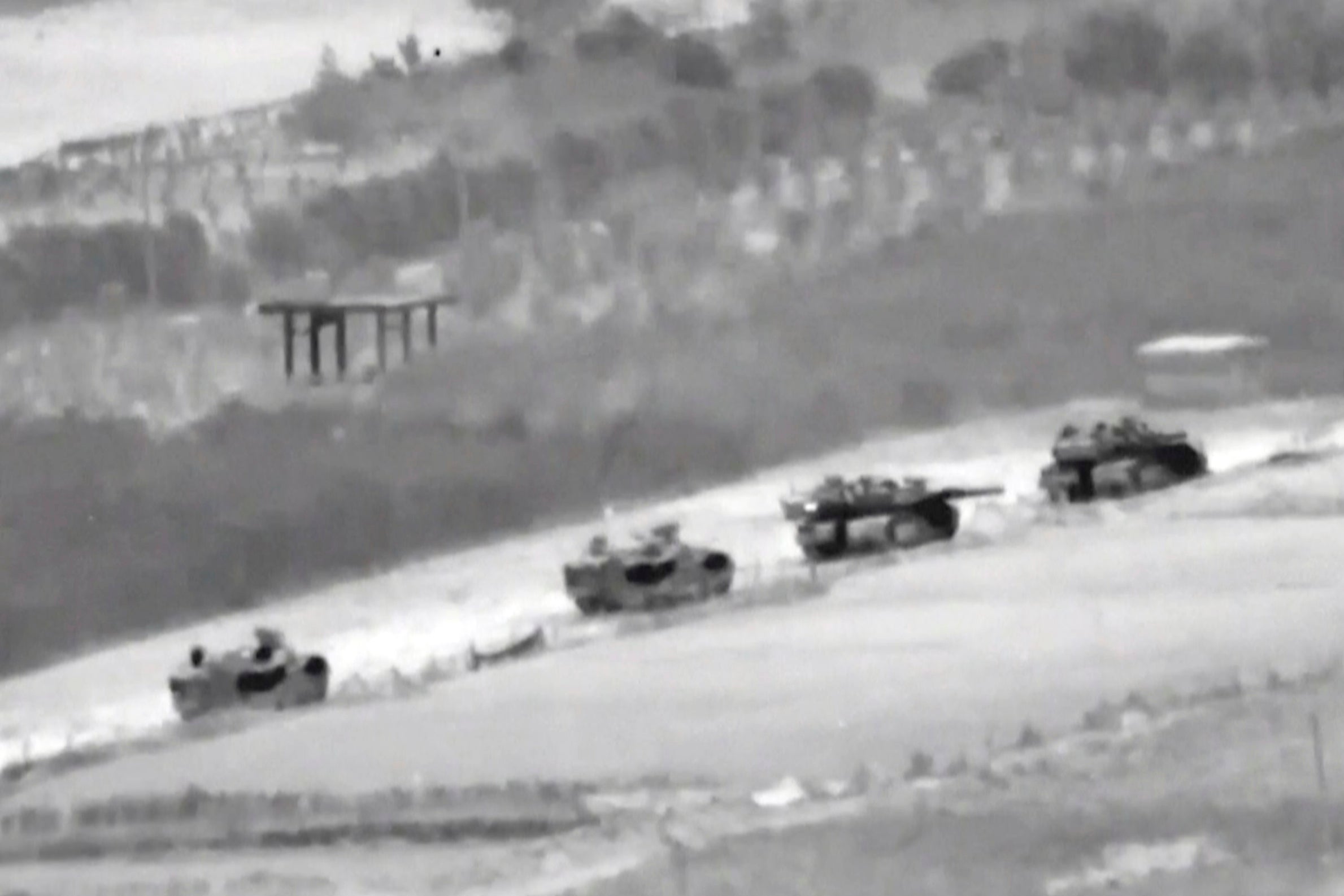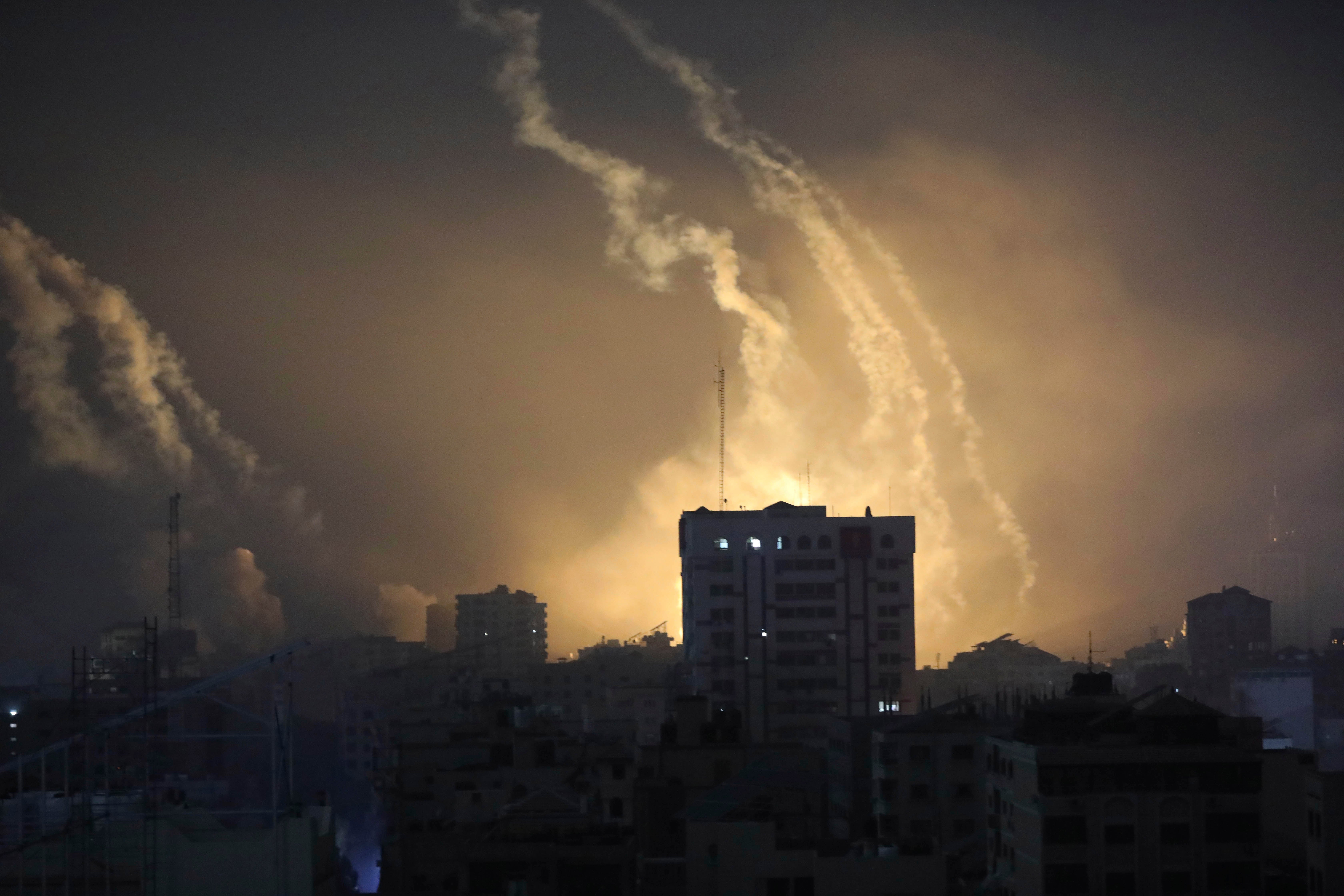Israel enters ‘second stage’ of war in Gaza with troops and tanks – alongside ‘unprecedented’ bombardment
Benjamin Netanyahu says war will be ‘long and difficult’ – while fears grow over the situation for Palestinian civilians in the Strip as communications go dark
Your support helps us to tell the story
From reproductive rights to climate change to Big Tech, The Independent is on the ground when the story is developing. Whether it's investigating the financials of Elon Musk's pro-Trump PAC or producing our latest documentary, 'The A Word', which shines a light on the American women fighting for reproductive rights, we know how important it is to parse out the facts from the messaging.
At such a critical moment in US history, we need reporters on the ground. Your donation allows us to keep sending journalists to speak to both sides of the story.
The Independent is trusted by Americans across the entire political spectrum. And unlike many other quality news outlets, we choose not to lock Americans out of our reporting and analysis with paywalls. We believe quality journalism should be available to everyone, paid for by those who can afford it.
Your support makes all the difference.Israel has entered the “second stage” of its war on Hamas, prime minister Benjamin Netanyahu has said, with an extended ground operation inside Gaza involving tanks and troops. That is backed up by the heaviest aerial bombardment the besieged Strip has faced since the retaliatory airstrikes began.
The Israeli leader said that this will be a “long and difficult” conflict but that the military “will not withdraw”.
“We are only at the beginning. The battle within the Gaza Strip will be difficult and long; this is our second war of independence,” he added.
The Israeli military announced late on Friday it was “widening” its offensive in Gaza. In the morning it released grainy footage of aerial and naval strikes as well as videos of tanks and infantry driving through the enclave. Israeli security sources confirmed to The Independent that as of Saturday afternoon troops remain inside Gaza.
Along the border with Gaza, the haunting boom of Israeli tank, naval and aerial fire sounded like a drumbeat – shaking the ground kilometres away.
Israel launched its heaviest-ever bombing campaign on Gaza in retaliation for a bloody 7 October attack by Hamas militants, who raided southern Israel killing 1,400 people and taking about 230 hostage.
“Last evening, the ground shook in Gaza,” the defence minister, Yoav Gallant, said. “We attacked above ground and underground. The instructions to the forces are clear. The campaign will continue until further notice.”
The Israeli military also released another “urgent message for the residents of Gaza” which calls on civilians from northern Gaza to temporarily relocate south.
The armed wing of Hamas, meanwhile, pledged to fight Israel’s ground operation with “full force”, saying on Telegram it was engaging with the Israeli military in Beit Hanoun, the northeast of Gaza and the central area of al-Bureij refugee camp.
The United Nations and international rights groups have said the bombardment is so heavy mobile, internet and landlines have been cut off, igniting fears about the safety of more than 2 million people, including some 200 British citizens, who remain in Gaza.
The International Committee of the Red Cross and the World Health Organisation said the communications blackout means people are unable to call ambulances, adding to the crisis.

Just moments before the network went down, British citizens in Gaza told The Independent about how hospitals were overwhelmed, medical supplies were low and clean drinking water was running out.
“As bombardments intensify, people cannot reach the Palestinian Red Cross to call an ambulance,” Robert Mardini, ICRC’s director general wrote on social media.
“We are deeply worried for the safety of first responders and for all civilians in Gaza. There is no safe place to go.”
The head of the WHO Tedros Adhanom Ghebreyesus added that the evacuation of patients is not possible under such circumstances.
Asked whether Israel had knocked out telecoms services, Israel’s chief military spokesperson, Rear Admiral Daniel Hagari said: “We do what we have to do to secure our forces for as long as we must, temporary or permanent, as much as we need to and we will not say anything further about that.”
Juliette Toma, a spokesperson for the UN’s Palestinian refugee agency, UNRWA, told The Independent without communications it was near impossible to operate their humanitarian support programme, including delivering fuel to bakeries and hospitals.
She said the agency had “patchy” communication via a single satellite phone with their director who is in the south of the Strip. She said at least 53 UNRWA staffers have already been killed since the start of the offensive, including one father-of-six who died while collecting bread.
“We are terrified that we could lose even more as a result of the bombardment last night,” Ms Toma added.

The UN secretary-general, Antonio Guterres, said he was surprised by Israel's escalation of the bombardments in Gaza, and repeated a call for an immediate humanitarian ceasefire for the delivery of aid.
“I was encouraged in the last days by what seemed to be a growing consensus in the international community ... for the need of at least a humanitarian pause in the fighting,” Mr Guterres said in a statement.
“Regrettably, instead of the pause, I was surprised by an unprecedented escalation of the bombardments and their devastating impacts, undermining the referred humanitarian objectives.”
In Ashkelon, a southern town that has been under rocket fire, Ami Hkmon, 54, a member of the city council and Mr Netanyahu’s political party, said his town had rallied behind the military. He rejected international calls – and the UN General Assembly vote – for a humanitarian truce to allow in badly needed aid for Palestinian civilians.
“No to a ceasefire, we do not care what they think. If we lose this war we lose the country,” he said bluntly. “If there isn’t a full ground offensive, then the citizens will do it ourselves.”
Before the accelerated bombardment of Gaza, the health ministry in the Hamas-run Strip had already reported that Israeli strikes had killed 7,000 people, including nearly 3,000 children. That is already more than three times the death toll of the 2014 seven-week war between Israel and Hamas.

In Mr Netanyhu’s speech, he said that Hamas are “using people as human shields” in defending his military’s actions. But he has still faced anger over attempts to free hostages taken by Hamas into Gaza. Mr Netanyahu said he met with the families of hostages on Saturday and assured them they would do “everything possible” to retrieve them.
Earlier, hostage families – fearful of the fate of their loved ones under the heavy bombardment – staged a protest demanding an audience with Mr Netanyahu. In a statement, they said they spent “a long and sleepless night” and wanted an explanation.
“We haven’t been told anything to do with this military operation, the government hasn’t spoken to us, we need to know the release of the hostages is the first and primary priority,” said Yehuda Cohen, 66, who was holding a photo of his nephew Eliya Cohen at the protest in Tel Aviv. The 27-year-old was abducted from a music festival on 7 October and appeared in a video posted by Hamas being taken to Gaza.
His family said he was dragged from a pile of dead bodies and taken hostage.
“We want everyone, the whole world to intervene and help bring our relatives back. We need them all home safe immediately no matter what is happening with the war,” he added. “We all feel so alone.”
On Saturday evening, in his first comments since the war began, Hamas’s leader in the Gaza Strip Yahya Sinwar offered to release all hostages being held in Gaza in return for the release of all Hamas prisoners in Israeli jails. In a statement on the group’s official website, Sinwar said: “We are ready for an immediate exchange deal.”
During his address, Mr Netanyahu said the idea of a swap deal of hostages for Palestinian prisoners had been discussed within the Israeli war cabinet but declined to elaborate, saying revealing any details would be counterproductive.

Join our commenting forum
Join thought-provoking conversations, follow other Independent readers and see their replies
Comments